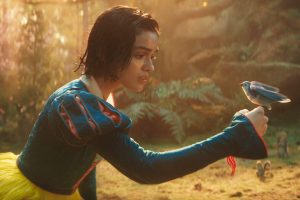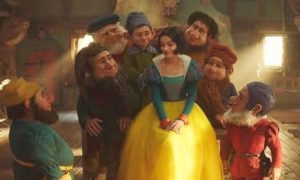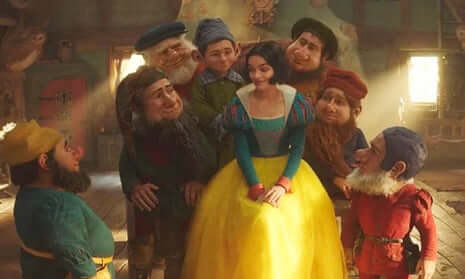world news
Disney’s ‘Snow White’ (2025): Navigating the Storm of Modern Controversies
Disney’s live-action adaptation of Snow White, scheduled for release in March 2025, has become one of the studio’s most controversial projects in recent years. What began as a reimagining of a beloved fairy tale has evolved into a cultural flashpoint, sparking heated debates over casting, politics, representation, and modern interpretations of classic stories. As the film nears its release, it finds itself at the center of conversations about identity, art, and societal values.
Casting Choices: Breaking Tradition or Embracing Diversity?
The casting of Rachel Zegler, a Latina actress, in the title role of Snow White marked a bold move by Disney to modernize its iconic character. Traditionally depicted as having “skin as white as snow,” Snow White’s ethnicity has long been viewed as integral to her identity. For many, Zegler’s casting was a welcome sign of progress, reflecting the importance of inclusive representation in Hollywood. However, critics argued that it strayed too far from the original depiction, sparking debates about fidelity to source material versus cultural evolution.
Zegler defended her role, highlighting how the story’s message transcends race and noting that the film is beloved in Spanish-speaking countries. She emphasized that Snow White’s value lies not in her complexion but in her courage, compassion, and sense of justice.
Adding to the complexity, Israeli actress Gal Gadot was cast as the Evil Queen. While her performance brought excitement, her political views—particularly her support for Israel—clashed publicly with Zegler’s pro-Palestinian sentiments. This ideological divide drew attention from political activists and fueled calls for boycotts from opposing sides. Instead of uniting fans, the casting sparked an unexpected cultural and political tug-of-war.

Reimagining the Seven Dwarfs: Sensitivity or Overcorrection?
Perhaps no element of the film stirred as much controversy as the reimagining of the seven dwarfs. In the original tale, these characters were endearing yet rooted in stereotypes. Actor Peter Dinklage, who has achondroplasia, criticized Disney for attempting to remake a story he felt was outdated and offensive to people with dwarfism. His comments led Disney to reevaluate its approach.
In response, the studio decided to reinvent the dwarfs as “magical creatures,” using CGI to avoid reinforcing negative stereotypes. While this decision was meant to promote inclusivity and avoid offense, it backfired in some communities. Several actors with dwarfism criticized Disney for eliminating meaningful representation and job opportunities for performers in a major production.
Martin Klebba, who voices Grumpy in the film, publicly voiced his disappointment about the scaled-down promotional efforts. He hinted that Disney might be distancing itself from the project due to fear of backlash, reflecting how sensitive the situation has become. The debate over the dwarfs encapsulates a broader struggle in media: when does progress become erasure?
Political Underpinnings: When Art Meets Activism
The real-life political stances of the film’s stars have played an outsized role in shaping public perception. Gal Gadot’s visible support of Israel and Rachel Zegler’s vocal advocacy for Palestinian rights created a geopolitical undertone that many audiences found impossible to ignore. Their ideological differences, though personal, were interpreted by viewers as representative of larger global conflicts.
In addition to the Middle Eastern divide, Zegler also faced backlash from resurfaced social media posts criticizing former President Donald Trump. These tweets reignited culture war debates in the U.S., particularly among conservative groups who viewed her as emblematic of a “woke” Hollywood.
Zegler has since issued apologies and statements calling for peace and unity. Still, the damage to public perception lingers. What was meant to be a fantasy adventure has become a battleground for political ideologies, where audiences assess not just the film’s content but the convictions of its cast.

Production Challenges: Strikes, Delays, and On-Set Incidents
Outside of ideological and cultural concerns, the film’s production was marked by logistical challenges. Industry-wide disruptions, including the COVID-19 pandemic and labor strikes, delayed filming and pushed the release date from 2024 to 2025. These delays disrupted momentum and increased skepticism about the project’s viability.
Additionally, the production suffered a fire-related accident on set, which briefly halted filming. Leaked photos from the set also caused confusion and criticism, as early images of the dwarfs (or “magical creatures”) were widely misinterpreted, leading to claims of an overly “woke” reinterpretation of the story.
These missteps compounded the film’s PR problems. In response, Disney opted for a more subdued promotional strategy, avoiding large media campaigns or red carpet premieres. While intended to prevent further controversy, the decision raised questions about Disney’s confidence in the project.
Los Angeles Dodgers x Hello Kitty 2024 World Series Champions Baseball Jacket
Early Reviews and Future Prospects: Can Controversy Eclipse Art?
Despite the ongoing swirl of controversy, early test screenings have revealed a more optimistic picture. Critics praised Rachel Zegler’s performance as emotionally rich and grounded, noting her chemistry with other cast members and the film’s strong musical numbers. The production design, costume work, and visual effects also earned positive remarks, particularly the way the magical world was brought to life.
However, some viewers remained critical of the CGI dwarfs, arguing that the characters lacked personality or presence compared to the original portrayals. These mixed reactions highlight the delicate balance the filmmakers tried to strike between honoring the past and reimagining the future.
At the box office, expectations remain guarded. Analysts predict a moderate opening, with the film potentially drawing $50 million or more in its first weekend. The final outcome may depend on whether audiences can separate the art from the politics or whether the controversies prove too distracting.
Regardless of its financial success, Snow White (2025) represents a new phase in Disney’s evolution. It reflects a company grappling with changing cultural tides, facing the challenge of retelling stories in a world where every creative choice is deeply scrutinized.
Los Angeles Dodgers x Hello Kitty 2024 World Series Champions Baseball Jersey
Conclusion
The 2025 remake of Snow White is more than a movie—it’s a cultural moment that encapsulates the complexities of modern filmmaking. With its diverse casting, political entanglements, production challenges, and polarizing choices, the film has sparked global conversations about race, representation, activism, and tradition.
While the controversies may overshadow the narrative for some, they also highlight the powerful role stories play in shaping public discourse. As Disney continues to update its classic tales for new generations, Snow White serves as both a warning and a beacon—a reminder that storytelling, no matter how magical, never exists in a vacuum.
From decoratedbliss

